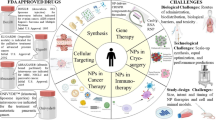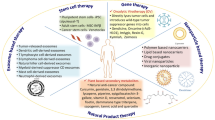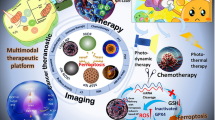Abstract
Many studies have demonstrated that curcumin has potential anticancer properties. This research aims to study the effect of iron (II, III) oxide (Fe3O4) nanoparticles coated with carboxymethyl chitosan containing curcumin combination with hyperthermia on breast cancer cells. Magnetic nanoparticles coated with carboxymethyl chitosan containing curcumin (MNP-CMC-CUR) were prepared and specified. MCF-7, MDA-MB-231, and human fibroblast cells were treated with free curcumin and MNP-CMC-CUR at concentrations of 0–60 µM and at different time points. A combined therapy of MNP-CMC-CUR and hyperthermia was performed on MCF-7 cells. The cytotoxicity of curcumin and MNP-CMC-CUR combined with hyperthermia was assessed by MTT. The changes in TP53 and CASPASE3 gene expression were evaluated using real-time PCR. Both cell apoptosis and cell cycle were studied by Annexin/PI staining. The results of MTT showed that the IC50 amount of MNP-CMC-CUR has significantly decreased compared to free curcumin (p < 0.05) and MNP-CMC-CUR in combination with the hyperthermia, and significantly reducing the metabolic activity of the cells (p < 0.05). Real-time PCR results revealed the up-regulation of TP53 and CASPASE3 (p < 0.05). The combinational therapy-induced cell apoptosis (64.51%) and sub-G1 cell cycle were arrested in MCF-7 cells. Based on these observations, a combination of MNP-CMC-CUR with hyperthermia could inhibit the proliferation of MCF-7 cells.






Similar content being viewed by others
Availability of data and materials
All the data are available in an Excel file.
References
Ali M, Smiley R (2018) Curcumin induces apoptosis via the capase-8 activated extrinsic pathway in MDA-MB-231 breast cancer cells. FASEB J 32:664–666
Banerjee A, Qi J, Gogoi R, Wong J, Mitragotri S (2016) Role of nanoparticle size, shape and surface chemistry in oral drug delivery. J Cont Rel. https://doi.org/10.1016/j.jconrel.2016.07.051
Bani MS, Hatamie S, Haghpanahi M, Bahreinizad H, Alavijeh MHS, Eivazzadeh-Keihan R, Wei ZH (2019) Casein-coated iron oxide nanoparticles for in vitro hyperthermia for cancer therapy. SPIN 9(2):1–10. https://doi.org/10.1142/S2010324719400034
Barahuie F, Dorniani D, Saifullah B, Gothai S, Hussein MZ, Pandurangan AK et al (2017) Sustained release of anticancer agent phytic acid from its chitosan-coated magnetic nanoparticles for drug-delivery system. Int J Nanomed. https://doi.org/10.2147/IJN.S126245
Boice A, Bouchier-Hayes L (2020) Targeting apoptotic caspases in cancer. Biochimica Et Biophysica Acta - Mol Cell Res 1867:118688. https://doi.org/10.1016/j.bbamcr.2020.118688
Chang D, Lim M, Goos JACM, Qiao R, Ng YY, Mansfeld FM et al (2018) Biologically targeted magnetic hyperthermia: potential and limitations. Front Pharmacol. https://doi.org/10.3389/fphar.2018.00831
Dhanavel S, Nivethaa EAK, Narayanan V, Stephen A (2017) In vitro cytotoxicity study of dual drug loaded chitosan/palladium nanocomposite towards HT-29 cancer cells. Mater Sci Eng C. https://doi.org/10.1016/j.msec.2017.03.058
Espinosa A, Di Corato R, Kolosnjaj-Tabi J, Flaud P, Pellegrino T, Wilhelm C (2016) Duality of iron oxide nanoparticles in cancer therapy: amplification of heating efficiency by magnetic hyperthermia and photothermal bimodal treatment. ACS Nano. https://doi.org/10.1021/acsnano.5b07249
Gao C, Zhao Y, Li H, Sui W, Yan H, Wang X (2015) Heat stress inhibits proliferation, promotes growth, and induces apoptosis in cultured Lantang swine skeletal muscle satellite cells. J Zhejiang Univ Sci B. https://doi.org/10.1631/jzus.B1400339
Gu Y, Yoshikiyo M, Namai A, Bonvin D, Martinez A, Piñol R et al (2020) Magnetic hyperthermia with ϵ-Fe2O3 nanoparticles. RSC Adv 10(48):28786–28797. https://doi.org/10.1039/d0ra04361c
Hallman K, Aleck K, Dwyer B, Lloyd V, Quigley M, Sitto N et al (2017) The effects of turmeric (Curcumin) on tumor suppressor protein (p53) and estrogen receptor (ERα) in breast cancer cells. Breast Cancer Targets Therapy 9:153–161. https://doi.org/10.2147/BCTT.S125783
Heydari M, Javidi M, Attar MM, Karimi A, Navidbakhsh M, Haghpanahi M, Amanpour S (2015) Magnetic fluid hyperthermia in a cylindrical gel contains water flow. J Mech Med Biol 15(5):1–16. https://doi.org/10.1142/S0219519415500888
Hossen S, Hossain MK, Basher MK, Mia MNH, Rahman MT, Uddin MJ (2019) Smart nanocarrier-based drug delivery systems for cancer therapy and toxicity studies: a review. J Adv Res 15:1–18. https://doi.org/10.1016/j.jare.2018.06.005
Hou CH, Lin FL, Hou SM, Liu JF (2014) Hyperthermia induces apoptosis through endoplasmic reticulum and reactive oxygen species in human Osteosarcoma cells. Int J Mol Sci. https://doi.org/10.3390/ijms151017380
Jose J, Kumar R, Harilal S, Mathew GE, Parambi DGT, Prabhu A et al (2020) Magnetic nanoparticles for hyperthermia in cancer treatment: an emerging tool. Environ Sci Pollut Res 27(16):19214–19225. https://doi.org/10.1007/s11356-019-07231-2
Khan MA, Zafaryab M, Mehdi SH, Ahmad I, Rizvi MMA (2016) Characterization and anti-proliferative activity of curcumin loaded chitosan nanoparticles in cervical cancer. Int J Biol Macromol. https://doi.org/10.1016/j.ijbiomac.2016.08.050
Khan MN, Haggag YA, Lane ME, McCarron PA, Tambuwala MM (2017) Polymeric nano-encapsulation of curcumin enhances its anticancer activity in breast (MDA-MB231) and lung (A549) cancer cells through reduction in expression of hif-1α and nuclear p65 (Rel A). Curr Drug Deliv. https://doi.org/10.2174/1567201814666171019104002
Klochkov SG, Neganova ME, Nikolenko VN, Chen K, Somasundaram SG, Kirkland CE, Aliev G (2021) Implications of nanotechnology for the treatment of cancer: recent advances. Semin Cancer Biol 69(August):190–199. https://doi.org/10.1016/j.semcancer.2019.08.028
Laffon B, Fernández-bertólez N, Costa C, Brandão F, Teixeira JP, Pásaro E, Valdiglesias V (2018) Cellular and molecular toxicity of iron oxide nanoparticles. In: Saquib Q, Faisal M, Al-Khedhairy A, Alatar A (eds) Cellular and Molecular Toxicology of Nanoparticles. Advances in Experimental Medicine and Biology, vol 1048. Springer, Cham
Liao S, Hu X, Liu Z, Lin Y, Liang R, Zhang Y et al (2019) Synergistic action of microwave-induced mild hyperthermia and paclitaxel in inducing apoptosis in the human breast cancer cell line MCF-7. Oncol Lett. https://doi.org/10.3892/ol.2018.9629
Manso J, Sharifi-Rad J, Zam W, Tsouh Fokou PV, Martorell M, Pezzani R (2021) Plant natural compounds in the treatment of adrenocortical tumors. Int J Endocrinol 2021:1–18. https://doi.org/10.1155/2021/5516285
Mansouri K, Rasoulpoor S, Daneshkhah A, Abolfathi S, Salari N, Mohammadi M et al (2020) Clinical effects of curcumin in enhancing cancer therapy: a systematic review. BMC Cancer 20:1–11. https://doi.org/10.1186/s12885-020-07256-8
Materón EM, Miyazaki CM, Carr O, Joshi N, Picciani PHS, Dalmaschio CJ et al (2021) Magnetic nanoparticles in biomedical applications: a review. Appl Surf Sci Adv 6:100163. https://doi.org/10.1016/j.apsadv.2021.100163
Miller KD, Nogueira L, Mariotto AB, Rowland JH, Yabroff KR, Alfano CM et al (2019) Cancer treatment and survivorship statistics, 2019. CA Cancer J Clin. https://doi.org/10.3322/caac.21565
Minaei SE, Khoei S, Khoee S, Vafashoar F, Mahabadi VP (2019) In vitro anticancer efficacy of multi-functionalized magnetite nanoparticles combining alternating magnetic hyperthermia in glioblastoma cancer cells. Mater Sci Eng C 101(April):575–587. https://doi.org/10.1016/j.msec.2019.04.007
Mirakabad FST, Akbarzadeh A, Milani M, Zarghami N, Taheri-Anganeh M, Zeighamian V et al (2016) A Comparison between the cytotoxic effects of pure curcumin and curcumin-loaded PLGA-PEG nanoparticles on the MCF-7 human breast cancer cell line. Artif Cells Nanomed Biotechnol. https://doi.org/10.3109/21691401.2014.955108
Mirzaie ZH, Irani S, Mirfakhraie R, Atyabi SM, Dinarvand M, Dinarvand R et al (2016) Docetaxel-Chitosan nanoparticles for breast cancer treatment: cell viability and gene expression study. Chem Biol Drug Des. https://doi.org/10.1111/cbdd.12814
Moideen J, Mohamed M, Alqahtani A, Khan BA, Fatease AA, Alqahtani T et al (2021) Preparation of soluble complex of curcumin for the potential antagonistic effects on human colorectal adenocarcinoma cells. Pharmaceuticals. https://doi.org/10.3390/ph14090939
Mortezaee K, Rosengren RJ (2019) Mechanisms of apoptosis modulation by curcumin: implications for cancer therapy. J Cell Physiol. https://doi.org/10.1002/jcp.28122
Olanipekun EO, Ayodele O, Olatunde OC, Olusegun SJ (2021) Comparative studies of chitosan and carboxymethyl chitosan doped with nickel and copper: characterization and antibacterial potential. Int J Biol Macromol 183(March):1971–1977. https://doi.org/10.1016/j.ijbiomac.2021.05.162
Ozkan D, Eskiler G, Kucukkara S (2020) The anti-proliferative and apoptotic effects of curcumin on feline mammary gland tumor cells in vitro. Iran J Vet Res 22:222
Parsian M, Unsoy G, Mutlu P, Yalcin S, Tezcaner A, Gunduz U (2016) Loading of Gemcitabine on chitosan magnetic nanoparticles increases the anticancer efficacy of the drug. Eur J Pharmacol. https://doi.org/10.1016/j.ejphar.2016.05.016
Pham XN, Nguyen TP, Pham TN, Tran TTN, Tran TVT (2016) Synthesis and characterization of chitosan-coated magnetite nanoparticles and their application in curcumin drug delivery. Adv Nat Sci Nanosci Nanotechnol. https://doi.org/10.1088/2043-6262/7/4/045010
Rao W, Zhang W, Poventud-Fuentes I, Wang Y, Lei Y, Agarwal P et al (2014) Thermally responsive nanoparticle-encapsulated curcumin and its combination with mild hyperthermia for enhanced cancer cell destruction. Acta Biomater. https://doi.org/10.1016/j.actbio.2013.10.020
Salatin S, Maleki Dizaj S, Yari Khosroushahi A (2015) Effect of the surface modification, size, and shape on cellular uptake of nanoparticles. Cell Biol Int. https://doi.org/10.1002/cbin.10459
Sanhaji M, Göring J, Couleaud P, Aires A, Cortajarena AL, Courty J et al (2019) The phenotype of target pancreatic cancer cells influences cell death by magnetic hyperthermia with nanoparticles carrying gemicitabine and the pseudo-peptide NucAnt. Nanomed Nanotechnol Biol Med. https://doi.org/10.1016/j.nano.2018.12.019
Saxena V, Hasan A, Pandey LM (2021) Antibacterial nano-biocomposite scaffolds of Chitosan, Carboxymethyl Cellulose and Zn & Fe integrated Hydroxyapatite (Chitosan-CMC-FZO@HAp) for bone tissue engineering. Cellulose 28(14):9207–9226. https://doi.org/10.1007/s10570-021-04072-6
Shariatinia Z (2018) Carboxymethyl chitosan: Properties and biomedical applications. Int J Biol Macromol 120:1406–1419. https://doi.org/10.1016/j.ijbiomac.2018.09.131
Subramani PA, Panati K, Narala VR (2017) Curcumin nanotechnologies and its anticancer activity. Nutr Cancer. https://doi.org/10.1080/01635581.2017.1285405
Sun L, Cui ZG, Zakki SA, Feng QW, Li ML, Inadera H (2018) Mechanistic study of nonivamide enhancement of hyperthermia-induced apoptosis in U937 cells. Free Radical Biol Med. https://doi.org/10.1016/j.freeradbiomed.2018.03.017
Vakili-Ghartavol R, Momtazi-Borojeni AA, Vakili-Ghartavol Z, Aiyelabegan HT, Jaafari MR, Rezayat SM, Arbabi Bidgoli S (2020) Toxicity assessment of superparamagnetic iron oxide nanoparticles in different tissues. Artif cells Nanomed Biotechnol 48(1):443–451
Valencia OM, Samuel SE, Viscusi RK, Riall TS, Neumayer LA, Aziz H (2017) The role of genetic testing in patients with breast cancer a review. JAMA Surg. https://doi.org/10.1001/jamasurg.2017.0552
Waks AG, Winer EP (2019) Breast cancer treatment: a review. JAMA J Am Med Assoc 321(3):288–300. https://doi.org/10.1001/jama.2018.19323
Wong KE, Ngai SC, Chan K-G, Lee L-H, Goh B-H, Chuah L-H (2019) Curcumin nanoformulations for colorectal cancer: a review. Front Pharmacol. https://doi.org/10.3389/fphar.2019.00152
Yahya EB, Alqadhi AM (2021) Recent trends in cancer therapy: a review on the current state of gene delivery. Life Sci 269(December 2020):119087. https://doi.org/10.1016/j.lfs.2021.119087
Yalcin S, Gündüz U (2021) Iron oxide-based polymeric magnetic nanoparticles for drug and gene delivery: in vitro and in vivo applications in cancer. Handb Polym Ceram Nanotechnol. https://doi.org/10.1007/978-3-030-40513-7_38
Zavisova V, Koneracka M, Gabelova A, Svitkova B, Ursinyova M, Kubovcikova M et al (2019) Effect of magnetic nanoparticles coating on cell proliferation and uptake. J Magn Magn Mater. https://doi.org/10.1016/j.jmmm.2018.09.116
Zhou H, Beevers SC, Huang S (2012) The targets of curcumin. Curr Drug Targets. https://doi.org/10.2174/138945011794815356
Zhou X, Hao Q, Lu H (2019) Mutant p53 in cancer therapy-the barrier or the path. J Mol Cell Biol 11:293–305. https://doi.org/10.1093/jmcb/mjy072
Zou Y, Liu P, Liu CH, Zhi XT (2015) Doxorubicin-loaded mesoporous magnetic nanoparticles to induce apoptosis in breast cancer cells. Biomed Pharmacother. https://doi.org/10.1016/j.biopha.2014.12.012
Funding
This manuscript is not supported by any foundation.
Author information
Authors and Affiliations
Contributions
SBK and SI designed the research. NP, NO and SI conducted the experiments. SMA contributed to hyperthermia design and device preparation. All the authors read and approved the manuscript, and all data were generated in-house, and no paper mill was used.
Corresponding author
Ethics declarations
Conflict of interest
No author has declared a conflict of interests.
Ethical approval
No humans or animals were used in this study.
Consent to participate
All the authors consent for their participation in doing the experiment and writing the paper.
Consent to publish
All the authors consent for publication.
Additional information
Publisher's Note
Springer Nature remains neutral with regard to jurisdictional claims in published maps and institutional affiliations.
Rights and permissions
About this article
Cite this article
Pazouki, N., Irani, S., Olov, N. et al. Fe3O4 nanoparticles coated with carboxymethyl chitosan containing curcumin in combination with hyperthermia induced apoptosis in breast cancer cells. Prog Biomater 11, 43–54 (2022). https://doi.org/10.1007/s40204-021-00178-z
Received:
Accepted:
Published:
Issue Date:
DOI: https://doi.org/10.1007/s40204-021-00178-z




